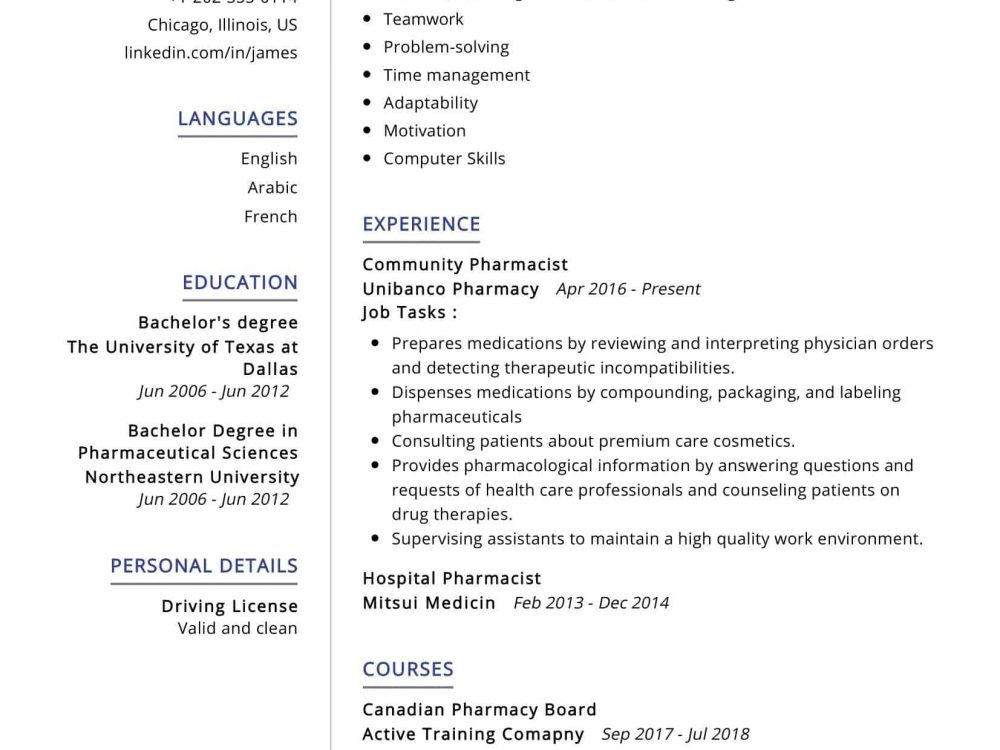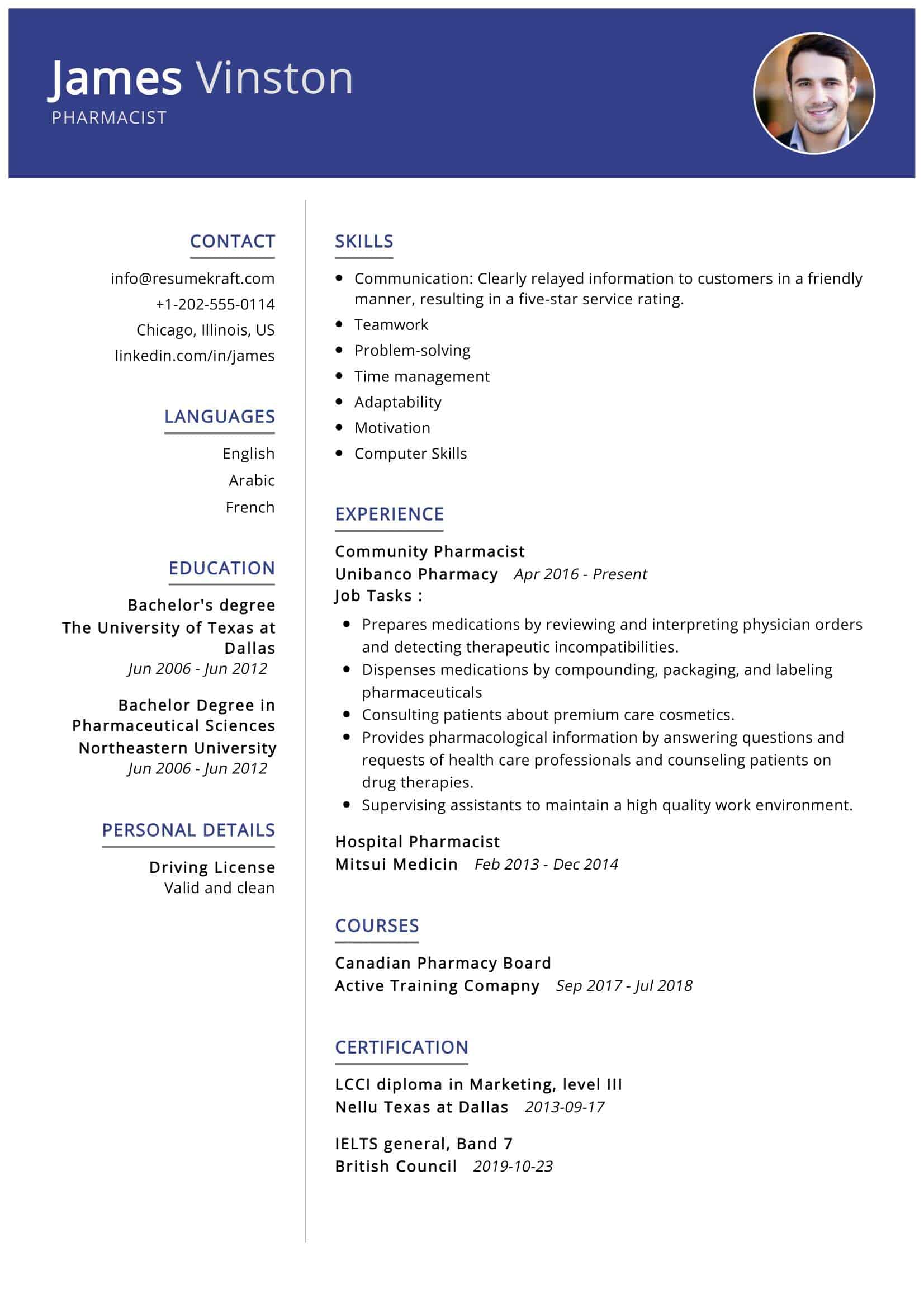Are you a Pharmacist by profession and looking for an exciting career? We have good news for you! use our professional Pharmacist Resume Sample. You don’t have to start writing from scratch. Just click “Edit Resume” and modify it with your details. Update the template fonts and colors have the best chance of landing your dream job. Find more resume samples.
Pharmacist Resume Sample
James Vinston
Pharmacist
Skills
Work Experience
Community Pharmacist
Unibanco Pharmacy
Job Tasks :
- Prepares medications by reviewing and interpreting physician orders and detecting therapeutic incompatibilities.
- Dispenses medications by compounding, packaging, and labeling pharmaceuticals
- Consulting patients about premium care cosmetics.
- Provides pharmacological information by answering questions and requests of health care professionals and counseling patients on drug therapies.
- Supervising assistants to maintain a high quality work environment.
Hospital Pharmacist
Mitsui Medicin
Education
Bachelor’s degree
The University of Texas at Dallas
Bachelor Degree in Pharmaceutical Sciences
Northeastern University
Languages
- French
- English
- German
- Chines
Career Expert Tips:
- Always make sure you choose the perfect resume format to suit your professional experience.
- Ensure that you know how to write a resume in a way that highlights your competencies.
- Check the expert curated popular good CV and resume examples
Pharmacist Resume with Writing Guide
There is no such thing as a perfect resume. Every organization will have unique needs and requirements, so there’s no way to write one that will fit every job application. However, there are certain elements of resumes that remain consistent across applications, like how you use your education section and highlight your experience with specific tools. The challenge is to find a balance between these consistent elements and the ones that are unique to each employer.
While you can’t write one resume that will fit every job, you can customize your resume for each application. You should tweak your resume slightly so that it fits a specific area of work, even if you’re applying for jobs in different industries or fields. Don’t expect to write one generic Pharmacist Resume to meet our industry’s needs; instead, anticipate possible barriers and prepare your resume accordingly.
Pharmacist Resume Writing Guide:
- Emphasize the skills, qualities, and methods of learning that are required for success in the position.
These skills are usually indicated by the job listing. Pay attention to keywords like ‘team player’, ‘analytical’, or ‘detail-oriented. Unsurprisingly, you’ll need soft skills for almost every job. Pay close attention to what types of things employers want from you and highlight your relevant experience. You want to highlight your skills so that the employer will see you as a perfect fit, even if they don’t know much about your field.
- Combine education with experience so that it reads like a narrative of your life and career, rather than a chronological list of your qualifications.
By this point, you have likely selected an area of work that interests you through the research or prior job application process. You can then tailor your resume for the specific position you’re applying for. For example, a Pharmacist Resume might include an educational section even if you’re applying for a job in another field. For example, if you studied Pharmacy as an undergraduate student, highlight that while talking about your experience instead of explaining it later on your resume.
- Emphasize your role in the profession and the area of work that you want to make your expertise known in.
Pharmaceutical companies are usually satisfied with basic qualifications and experience listed on a resume. They may open up an application to see what you are able to contribute, but they usually do not need much in the way of specific information about your education and experiences.
- Highlight what you did best at work and how you improved yourself as a professional.
As you add on the types of skills mentioned in step 1, be sure to include a section that describes what was most effective for your success at work and how it made you better as an individual.
List of Typical Responsibilities For a Pharmacist Resume:
- Monitoring all aspects of pharmacy operations, including inventory control.
- Obtaining and maintaining proper licenses and registrations with government agencies.
- Providing prescription drug information for clinical use and usage to pharmacists, patients, physicians or others who require the information.
- Collaborating with other health care professionals on patient and physician treatment recommendations.
- Information preparation for inclusion in the pharmaceutical compendium, or the National Drug Code (NDC).
- Reporting to local, state, and federal agencies concerning prescription drug issues, adverse reaction to drugs or dispensing errors that may have gone unobserved.
- Supervising all pharmacy personnel and ensuring adherence with all applicable record keeping and other regulatory requirements.
- Maintaining the confidentiality of patient information.
- Making recommendations regarding product substitutions or adjustments for various patient cases.
- Staffing of pharmacies and all aspects of pharmacy operations.
- Maintaining a constant review of pertinent literature and developing new pharmacist’s skills through continued education and professional development courses/courses offered by the organization on which the pharmacist is employed/self employed, other professional organizations, or from personal reading material or any other source that offers continuing education through conferences and seminars, online resources, etc.
Top 10 Must-have Pharmacist Skills:
- Pharmaceutical education: All pharmacists must complete a 4-year bachelor’s degree program followed by a 4-year doctor of pharmacy degree.
- Communication skills: Pharmacists interact with patients and their families, as well as doctors, medical staff and other members of the health care team.
- Customer service skills: Pharmacists serve an important role in health care as the patient’s primary contact for medical information and advice about prescription medications, over-the-counter drugs, dietary supplements, herbal remedies and vitamins.
- Teamwork and cooperation: Pharmacists collaborate with other health care professionals, including physicians, nurses, dietitians, pharmacists assistants and medical technicians, to provide the best possible care for their patients.
- Pay attention to details: Pharmacists need superior technical skills as they often administer medications to patients in many different ways.
- Ready access to prescription drugs: Pharmacists have a ready supply of prescription drugs that they can prescribe on behalf of their patients. They also may have their own private supply of prescription drugs for patient use.
- Education and training: Pharmacists are required to continue their education and training throughout their careers and must take mandatory continuing education courses.
- Math skills: Pharmacists must use these skills when calculating dosages and the cost of medication for their patients, as well as using formulas to calculate drug dosages.
- Excellent communication skills: Pharmacists must communicate effectively with patients, physicians, nurses, medical assistants, hospital administrators and other members of the health care team such as pharmacists’ assistants.
- Financial skills: Pharmacists must manage their own finances as they purchase, store and apply medication to their patients.
Tips to write a Pharmacist Resume Summary:
- Locate an example Pharmacist Resume Summary and analyze it for its strengths and weaknesses.
- Utilize the techniques in the example to create your own Pharmacist Resume Summary, which will effectively convey why you are a strong candidate.
- Keep in mind that you should be able to summarize your skills and qualifications on one page, so include only the most important information.
- Include targeted job experience, education, references, skills, accomplishments and awards not included in other sections of the Pharmacist Resume.
- Keep the Pharmacist Resume Summary focused and concise. The point of the statement is to showcase your dedication, not to bore people with information they do not care about.
- Make sure that all required information including offer letter, performance review, etc are included at the very end of the summary section of your Pharmacist Resume.
- The Pharmacist Resume Summary is one of the most crucial parts of your resume because this is where you communicate your qualifications to the employer in the most efficient and concise way possible.
- Always proofread all pages of your Pharmacist Resume for spelling, grammar and format before submitting it to an employer.
- Include a final Author’s Bio section at the very end of your resume for contact information to allow employers to reach you regarding job opportunities with their organization.
How to write a Pharmacist Resume with No experience:
- Use a simple, clear font. I’m partial to the Ariel font.
- Write a covering letter to go with your resume.
- Include all work experience, even side jobs. Include any volunteer work that’s relevant (e.g., caregiving in a hospital).
- Work experience is more important than education; include the dates you worked and what you did (with numbers) for each place you’ve worked.
- Include volunteer work in the space for “Relevant Skills and Experience.” Use action verbs in your description.
6. Include your key selling points at the top of the resume, under the “Relevant Skills and Experience” section. I recommend three or four selling points for a pharmacist resume. - Include relevant coursework and certifications on your resume if you have them, but don’t make them all about you — make sure they’re relevant to the job you want! (e.g.
How to write a Pharmacist Cover Letter:
- Find the Right Outfit
If this is a job interview, you’ll need to package yourself in a professional way. Ensure that your attire fits with the job’s dress code and appropriates to the office environment. A collared shirt and long-sleeved shirt make for an excellent combination for office environments and interviews. - Be Polite, Professional, and Respectful
This doesn’t mean that you have to be boring—describing your skills in the most positive light possible is a great way of highlighting them. - Explain how You Fit Into the Company
According to the Hays Group survey, job seekers who explain how they fit into a company are more likely to be hired than those who simply describe why they would be a good hire. - Be Honest about Your Previous Employments
Remember that you’re supposed to be selling yourself in the end, so ensure that you don’t exaggerate your past employment experience. Instead, talk about your experience in the way that is most effective for you. If you’re working towards a career change, talk about your transferable skills and experience. - Make sure Your Resume Is Professional
A professionally formatted resume best serves you in the long run as it helps to highlight your accomplishments and abilities. Moreover, it makes a greater impression on hiring managers who are presented with a focused resume as opposed to one that lacks organization or details. - Say Thanks…
…after receiving a job offer from the company. Remember that not all companies follow this pattern, but it’s a great way to express your gratitude for extending a hand in your time of need and for believing in your capabilities as a candidate. - Be Thorough
You’ll want to include everything that you can think of—certifications, awards, etc—to make sure that everyone receives the full picture of your skillset.
Key Takeaways:
- Do not forget to include contact information and your personal information on your resume.
- Mention any awards, scholarships, or degrees earned; additional academic achievements; certifications received; and other related awards.
- Use a professional email address for email correspondence, do not use personal email accounts which could be seen as unprofessional.
- If you have strong communication skills with multiple languages, make sure to mention it on the resume.


